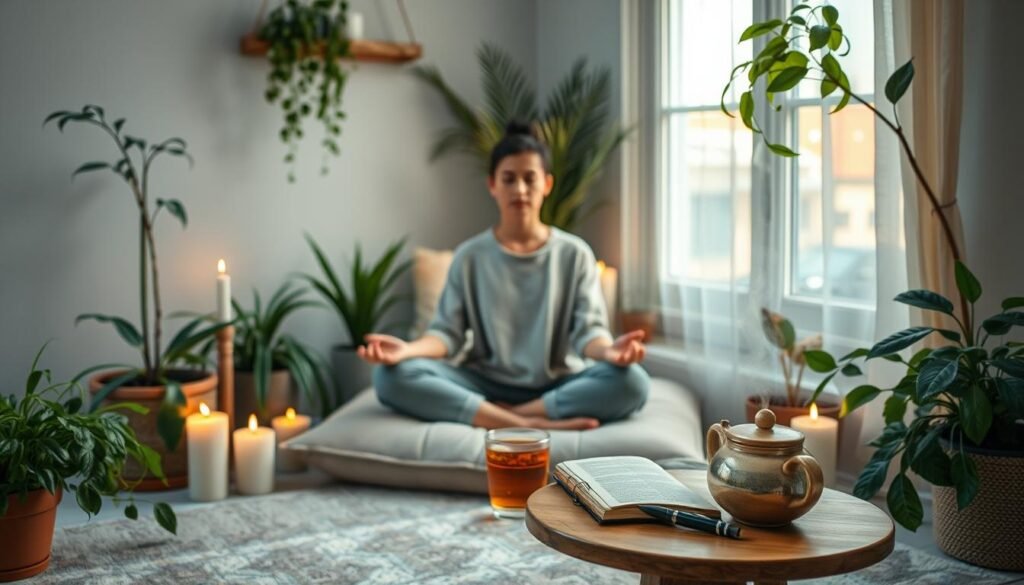About 64% of Americans with mental health issues feel worse during the holidays. This is known as post Christmas depression or the holiday blues. It happens when the excitement of the season fades. People feel sad, lonely, and disillusioned, a state called festive burnout. After the fun ends, the gloom can stick around, making it hard to be happy. It’s important to understand this to start the New Year on a positive note.
If you’re looking for help, there are ways to feel better. Taking care of yourself, keeping a routine, and watching your spending can help. To discover more about fighting these feelings, check out managing post-holiday depression.
Key Takeaways
- Post Christmas depression affects many, especially those with existing mental health issues.
- Common causes include unmet expectations, emotional exhaustion, and financial strain.
- Recognizing symptoms early can lead to effective coping strategies.
- A routine and engagement in self-care are crucial for recovery.
- Maintaining social connections post-holidays can alleviate feelings of loneliness.
Understanding Post Christmas Depression
Post Christmas depression features feelings that pop up after the holiday fun ends. People often feel lost and sad when the celebrations stop suddenly. The joy of holiday activities leads to an emotional peak, and its quick finish may cause a holiday hangover.
Defining the Phenomenon
This condition can show up as anxiety, tiredness, and crankiness. Many start to think about holiday hopes that weren’t met, making things worse. The shorter days of winter might also make some people feel more down.This mix of emotions is hard to deal with.
Statistics Behind Post Holiday Blues
About 64% of individuals report feeling post-holiday blues. Factors like family stress during get-togethers play a role. Also, the gift-giving pressure affects about 46% of people. These blues can stay around for two weeks after holidays. Knowing how common this is can help us handle these feelings better.
The Causes of Post Christmas Depression
Knowing why people feel down after Christmas helps us understand their emotional struggles. Many factors play a role, including not meeting holiday hopes, spending too much money, and eating or drinking too much.
Unmet Expectations and Emotional Exhaustion
The holiday season often brings hopes for happiness and perfection. But when expectations aren’t met, people can feel let down. This disappointment leads to feeling emotionally worn out.
Research shows that up to 64% of people feel sad or depressed after New Year’s Day. The main causes are stress and not achieving what they hoped for during the holidays. The busy holiday season can make this worse, leaving people feeling tired.
Financial Strain and Overindulgence
Money worries after Christmas also cause post-holiday blues. About 30% of people feel depressed because they spent too much. The stress from bills adds up, making everything feel worse.
Eating too much unhealthy food and drinking too much alcohol over the holidays can affect mental health. Studies have found that this leads to feeling sad and tired. Knowing this can help people find better ways to deal with stress after the holidays.
| Cause | Impact | Statistics |
|---|---|---|
| Unmet Expectations | Emotional Exhaustion | 64% experience post-holiday sadness |
| Financial Strain | Increased Stress | 30% feel depression related to bills |
| Holiday Diet | Feelings of Sadness and Fatigue | Unhealthy eating habits linked to mood dips |
Recognizing the Symptoms
It’s important to know the symptoms of depression after the holiday season. This helps manage your emotional health. Many people face different emotional and physical symptoms.
Spotting these signs early is key to finding the right help.
Common Emotional and Physical Symptoms
Depression after Christmas can show in many ways. It affects both your mind and body. Common emotions include:
- Low mood or sadness
- Increased irritability
- Feelings of emptiness or hopelessness
There are physical signs too, such as emotional exhaustion, tiredness, and trouble sleeping. People often lose motivation and feel more anxious. These are part of a bigger pattern of stress after holidays. They signal the need for professional help.
When to Seek Professional Help
Don’t wait to get help for symptoms of depression. If you feel down for more than two weeks, it’s time to act. Or if these feelings mess with your day-to-day life.
Talking to a healthcare provider is a good step. They can tell you how serious it is and what you can do to get better. Getting help early often leads to a quicker recovery.
Holiday Blues vs. Seasonal Affective Disorder
Knowing how holiday blues and seasonal affective disorder (SAD) differ is key when it’s cold. Both make people sad, but for different reasons. Holiday blues come after holiday times, linked to unreal hopes or social worries. SAD lasts longer, caused by short winter days.
Similarities and Differences
Holiday blues and SAD both affect mental health, but in different ways. About 40% of adults feel social anxiety during celebrations, leading to holiday blues. This usually goes away after the holidays. SAD, on the other hand, can cause fatigue, moodiness, and a desire for sweets. It can disrupt lives for months.
Impact of Seasons on Mental Health
In places like the Pacific Northwest and Northeast, SAD is common because the skies are grey for months. Less sunshine lowers important body chemicals, causing winter sadness. Depression is confirmed if sadness lasts over two weeks. During holidays, 64% of people with mental issues feel worse. It’s critical to find ways to cope, including getting help if needed.
| Feature | Holiday Blues | Seasonal Affective Disorder |
|---|---|---|
| Duration | Short-term, usually ends after holidays | Long-term, can last several months |
| Common Causes | Social anxiety, unmet expectations | Reduced sunlight exposure |
| Symptoms | Fatigue, irritability during holidays | Hypersomnia, weight gain, severe depression |
| Prevalence | Affects around 40% of adults | More common in fall and winter months |
Self-Care Strategies for Recovery
It’s key to use good self-care methods after Christmas to tackle depression. Making your emotional health a priority helps a lot in getting better. Mindfulness and physical activities every day can help balance your mind.
Engaging in Mindfulness Techniques
Mindfulness like meditation, deep breathing, and writing in a journal are great for emotional balance. They let you face your feelings instead of hiding them. Mindfulness gives a clearer view of your thoughts and feelings, reducing stress and building emotional strength.
Importance of Physical Activity
Being active is not only good for your body but also improves your mental health. Working out releases endorphins, which make you feel happier. Something as simple as walking, running, or doing yoga can raise your energy and fight off sadness. It’s important to have a regular schedule that includes self-care, mindfulness, and physical activity for the best recovery.
| Self-Care Strategies | Description | Benefits |
|---|---|---|
| Mindfulness Meditation | Practicing meditation to enhance awareness and reduce stress. | Improves emotional regulation and decreases anxiety. |
| Yoga | Combining physical postures and breathing techniques. | Enhances flexibility and promotes mental serenity. |
| Regular Walks | Engaging in brisk walks outdoors. | Boosts endorphin levels and improves mood. |
| Deep Breathing | Using deep breathing exercises to calm the mind. | Reduces stress and enhances focus. |
| Journaling | Writing down thoughts and feelings for clarity. | Helps in processing emotions and managing anxiety. |
Building a strong self-care routine is key for those feeling down after the holidays. It’s also important to seek help when needed. Organizations like various mental health organizations are there to support you.
Setting a Routine to Combat Mood Dips
A structured routine is key to handling mood changes after holidays. It gives a sense of purpose and balance. This helps lessen feelings of emptiness and keeps emotions stable.
Benefits of Structured Daily Activities
A structured routine has many benefits for mood management. It helps organize your day, which reduces chaos. This focus improves mood.
It also sets a regular sleep and eating schedule, boosting health and mood. Including fun activities motivates you to stay active. These routines encourage healthy habits for better well-being.
How to Reestablish Healthy Habits
Returning to healthy habits can boost your emotional health. Here are some tips:
- Keep regular times for sleeping and eating to maintain balance.
- Add in physical activities, like walks or sports, for a better mood.
- Spend time on hobbies that help you connect with others, like cooking together.
- Cut down on social media to avoid feeling tired or comparing yourself to others.
- Practice being grateful to lift your spirits and enjoy life more.

Social Connections and Emotional Support
Maintaining connections after the holidays is crucial for well-being. It helps fight loneliness and sadness. Engaging with friends and family, by doing things together, creates happy memories. These memories make the winter feel less dreary.
Importance of Staying Connected Post-Holidays
Older adults often feel the post-holiday blues deeply. They may face mental health challenges due to less socializing or health issues. If they seem more irritable, less happy, or withdraw from usual activities, it’s a warning sign. Loved ones should watch for these signals in winter, after holiday festivities end.
Finding Joy in Shared Activities
Group activities or volunteering can brighten older adults’ days. Sites like meetup.com make finding social events easy. This reduces feelings of isolation.
Exercise suited for seniors boosts their mood, too. It releases endorphins, which help fight sadness. This shows how vital community ties are.
| Activity | Benefits |
|---|---|
| Group Outings | Encourages social interaction and connection |
| Volunteer Opportunities | Provides purpose and reduces feelings of loneliness |
| Exercise Classes | Boosts mood through endorphin release |
| Family Gatherings | Reinforces emotional support and joy |
Strong community ties can turn the winter blues into warm memories. Staying active and involved brings joy during winter. It helps shake off the gloom from post-holiday time.
Financial Planning to Alleviate Stress
The holiday season can make us feel financially stressed and lead to post-Christmas depression. Making a plan for your money can really help handle the stress from holiday bills. It’s smart to create a clear budget. This lets you really understand your money and stops you from spending too much after the holidays.
Creating a Budget for Post Holiday Expenses
To budget well after the holidays, it’s important to think about how you spent money before. You should:
- Reflect on Previous Spending: Look at your holiday shopping to see where you can spend less.
- Prioritize Essential Expenses: Make sure you cover your must-pay bills and save for future costs.
- Utilize Gift Cards: Many Americans have about $200 in unused gift cards. These can help cover expenses in the early months.
- Explore Cashback Options: Apps like Rakuten and Ibotta offer cash back on purchases, helping with your budget.
Long-term Financial Strategies
Planning all year for holiday spending can keep your finances healthy. Starting a savings plan specifically for the holidays can lessen stress during busy shopping times. Experts suggest:
- Setting Realistic Expectations: Know what you can afford and share this with your loved ones to lower stress.
- Creating Annual Savings Goals: Put away money every month to have enough for celebrating next year.
- Engaging in Low-Cost Celebrations: Choose homemade gifts or experiences over buying things to save money.
Smart money planning means knowing that bills shouldn’t wreck your peace of mind. Planning your spending after the holidays and using long-term strategies can cut down stress. This is good for your overall mental health. For more support, self-care practices can also improve how you feel emotionally. They help in dealing with money stress and improving mental well-being.

Fun Activities to Brighten Winter Sadness
Engaging in fun activities helps beat the winter blues and uplifts your mood. Finding joy during the cold months needs creativity and effort. Planning events and trying new hobbies can make everyday life exciting and joyful.
The strategies mentioned can make you happier and bring people closer.
Planning Engaging Events for the New Year
Organizing social events, like potlucks or game nights, keeps us connected with loved ones. These gatherings are not just for fun but also boost happiness in winter. Think about outdoor activities such as ice skating or winter hikes for fun and exercise.
Exploring New Hobbies or Interests
Winter is the perfect time to start new hobbies that spark creativity and personal expression. Trying activities like painting, cooking, or playing a musical instrument can be thrilling. Adding winter-themed activities, like photography in snowy settings, brings adventure. Trying new things makes you feel accomplished, helping to combat winter sadness.
Mindfulness and Mental Health Practices
Practicing mindfulness through reflective techniques can improve mental health. It’s especially helpful when facing post-Christmas blues. These methods let individuals explore their thoughts and emotions. This fosters greater self-awareness and emotional resilience.
Utilizing Journaling and Reflection
Journaling is a powerful tool for self-reflection. It allows people to express feelings and experiences. By writing, individuals can process emotions and clarify thoughts. This makes it easier to handle stress and anxiety.
Writing encourages mindfulness and a deeper understanding of personal triggers and reactions. It can be therapeutic, helping to uncover hidden or complicated thoughts. This brings them to the forefront for examination and understanding.
Incorporating Meditation or Yoga Into Daily Life
Meditation has been shown to reduce anxiety and depression. It also boosts emotional well-being. Setting aside time for mindfulness meditation brings calm, especially after the holidays.
Adding yoga to daily routines improves both physical and mental health. These practices aid in recovering from emotional exhaustion and promote a balanced outlook. For guidance in these practices, resources are available online, such as strategies to manage persistent depressive disorder.

| Practice | Benefits |
|---|---|
| Meditation | Reduces anxiety and enhances emotional well-being |
| Journaling | Facilitates emotional processing and increases self-awareness |
| Yoga | Improves physical fitness while boosting mental health |
Conclusion
When the holiday season ends and the New Year begins, many feel the sting of post Christmas blues. These emotions include sadness, stress, and anxiety. It’s important to tackle these feelings to boost emotional health.
Self-care is key to feeling better. Focus on being mindful and connecting with others. Enjoying hobbies, keeping a routine, and being smart about money can fight the blues. These steps also promote personal growth. For more tips, check out this resource on battling the post Christmas.
Following these recovery tips can turn your post-holiday feelings into chances for growth. It prepares you for a good start to the New Year. By focusing on emotional health, the post-Christmas period can be positive. This ensures a hopeful beginning to the year ahead.